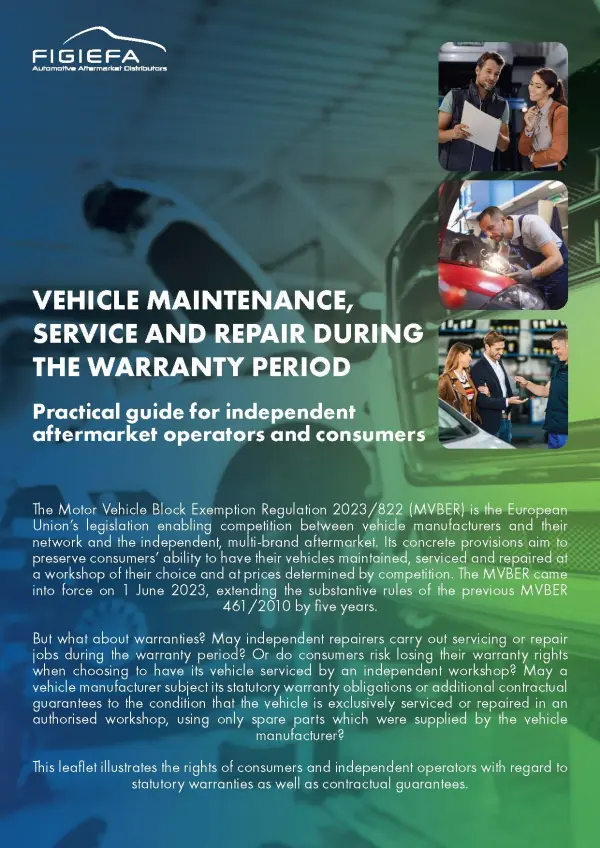New Brochure on Repair and Maintenance of Vehicles During the Warranty Period
FIGIEFA proudly presents its new brochure and practical guide for independentaftermarket operators andconsumers, on vehicle maintenance and repair during the warranty period.
The Motor Vehicle Block Exemption Regulation 2023/822 (MVBER) is the European Union’s legislation enabling competition between vehicle manufacturers and their network and the independent, multi-brand aftermarket. Its concrete provisions aim to preserve consumers’ ability to have their vehicles maintained, serviced and repaired at a workshop of their choice and at prices determined by competition. The MVBER came into force on 1 June 2023, extending the substantive rules of the previous MVBER 461/2010 by five years.
But what about warranties? May independent repairers carry out servicing or repair jobs during the warranty period? Or do consumers risk losing their warranty rights when choosing to have its vehicle serviced by an independent workshop? May a vehicle manufacturer subject its statutory warranty obligations or additional contractual guarantees to the condition that the vehicle is exclusively serviced or repaired in an authorised workshop, using only spare parts which were supplied by the vehicle manufacturer?
This leaflet illustrates the rights of consumers and independent operators with regard to statutory warranties as well as contractual guarantees.
And here is a practical Q&A on the issue:
How to assess whether the warranties respect the MVBER?
It is essential to understand that for assessing whether a warranty complies withthe MVBER, several parameters have to be taken into account. However, case lawand Frequently Asked Questions (FAQs) published by the European Commission in2012, provide the following guidance:
Example 1:
The vehicle manufacturer specifies that warranties are not applicableif prior repair and maintenance works were done in an independent workshop orwith aftermarket spare parts (servicing or parts restriction). Is this limitation ofwarranty valid? Does the assessment differ depending on whether the servicing orparts restriction is set out in the purchase contract or rather in the servicing orwarranty booklet?
No. Vehicle manufacturers may not refuse warranty claims relating tomanufacturing defects just because prior repair and maintenance works wereexecuted by independent repairers and/or with spare parts provided by theindependent aftermarket. Furthermore, in practice, the servicing or partsrestrictions may be contained not in the purchase contract, but rather in anotherdocument, such as the servicing or warranty booklet - the assessment of theserestrictions is in principle the same irrespective of the document in which theyappear. Irrespective of where the restriction is stipulated, it is likely to leadconsumers to believe that the warranty will be invalidated if servicing work iscarried out in independent garages or if alternative brands of spare parts areused. This, in turn, is likely to unlawfully foreclose such operators or closealternative channels for spare parts' distribution.
Example 2:
Does the assessment of servicing or parts restrictions differ if they areset out in an additional contractual warranty issued by the authorised network ofthe vehicle manufacturer (instead of by the vehicle manufacturer itself) at thesale of the vehicle or shortly after?
No. The fact that the servicing or parts restrictions are not set out in the vehiclemanufacturer’s warranty but are instead found in an additional contractualwarranty issued by the authorised network at the moment of the sale of thevehicle (or shortly thereafter) will not generally alter the assessment of the saidrestrictions. Importers, dealers and authorised repairers are part of the selectivedistribution system of the vehicle manufacturer. If these parties agree to offer awarranty scheme and the warranties in question contain a servicing or partsrestriction, this is likely to unlawfully foreclose independent repairers or shut offalternative spare parts' distribution channels.
Example 3:
Does the assessment of servicing or parts restrictions differ if they areset out in an additional contractual warranty arranged by the vehiclemanufacturer (or by the authorised network at the sale of the vehicle or shortlyafter) through a third party such as an insurer?
No. The fact that warranties that contain a servicing or parts restriction arearranged through a third party (typically an insurer) by the vehicle manufacturer(or by the members of its authorised network at or shortly after the sale of thevehicle (see example 2 above) does not in principle alter the assessment of thesaid restrictions. The fact that the additional contractual warranty containing theservicing or parts restriction is arranged through a third party does not change theassessment. The decisive element is whether the servicing or parts restriction is afactor within the control of one or more of the parties to the network of the vehiclemanufacturer and therefore whether it is implementation is likely to forecloseindependent repairers or shut off alternative channels for spare parts' distribution.
Example 4:
A consumer decides to lease a vehicle. May the bank or leasingcompany oblige the consumer to have the vehicle repaired or serviced byauthorised repairers and with original spare parts only?
This depends on the leasing contract and whether it is agreed that the consumer(lessee) shall buy the vehicle from the bank at the end of the leasing period or not.Whenever the parties to the leasing contract agree that the consumer will buy thevehicle from the leasing company bank at the end of the leasing contract, it is theconsumer who should decide where he wants the vehicle to be repaired andmaintained and with which spare parts during the leasing period. In such a case,the restriction between the bank and the consumer is null and void. By contrast, ifthe parties to the leasing contract agree that the vehicle should remain with thebank or the leasing company at the end of the leasing period, the bank or theleasing company should be allowed to decide where the vehicle should bemaintained and repaired during the term of the leasing contract and with whichspare parts. In such circumstances, the restriction agreed upon between theleasing company bank and the consumer is valid. Similarly, where a motorinsurance contract provides that the insurance provider may select the workshopfor accident repair, such a provision is compatible with EU competition law.
Example 5:
Does the assessment of servicing or parts restrictions differ if theserestrictions are set out in an additional contractual warranty bought by aconsumer from an authorised repairer or from the vehicle manufacturer someyears after the purchase of the vehicle?
Yes. Such a warranty is in general, unlikely to result in a breach of the EuropeanUnion’s competition rules. Years after the vehicle purchase, authorised dealers donot enjoy the same degree of privileged access to customers as they do in theperiod shortly after the purchase. As a consequence, alternative providers ofadditional contractual warranties, such as chains of independent repairers andinsurance firms are less likely to face significant barriers preventing them fromoffering their products to vehicle owners.
Example 6: Should a consumer be able to benefit from the warranty on a vehiclethat (s)he has purchased from an authorised dealer in another Member State ofthe European Union?
Yes, although some limitations concerning the scope of the warranty may apply. Ifvehicle suppliers fail either to honour warranties on vehicles purchased byconsumers from authorised dealers in other Member States or to contractuallyoblige their authorised repairers to carry out warranty work on such vehicles, thiswould constitute a restriction on sales and the selective distribution agreements atstake are likely to be contrary to European Union’s competition rules. The samereasoning applies to free servicing or work carried out as a result of a productrecall. The reasoning does not change if the consumer has bought the vehiclethrough a mandated intermediary. Warranties on vehicles bought from authoriseddealers in other EU Member States should also not be subject to additionaladministrative procedures that lead to delays in the work being carried out.However, it should be noted that warranty terms may vary from one EU MemberState to another, and that vehicle manufacturers typically take account of the costof respecting a particular set of warranty terms when setting the recommendedpurchase price of the vehicle. If a vehicle is exported, the vehicle supplier maylegitimately apply the terms of the original warranty applicable to the vehicle, andwill thus be under no obligation to apply more beneficial warranty terms that maybe included with vehicles sold in the Member State of import. It should also benoted that if a consumer has paid separately for a mobility scheme, that schememay be limited in scope to a particular Member State.
Example 7: Does the assessment of a parts restriction differ if, for operations notcovered by warranty, the vehicle manufacturer requires the use of a spare part(such as a lubricant) from a specific supplier (rather than stipulating that its ownbrand of spare parts be used)?
Generally, no. Such a restriction is likely to result in a breach of the EuropeanUnion’s competition rules. As with a parts restriction requiring the use of the vehiclemanufacturer's brand of spare parts as a condition for the warranty to apply, aparts restriction requiring (rather than merely recommending) the use of spareparts from a specific producer is likely to foreclose alternative channels for spareparts' distribution. However, a vehicle manufacturer may legitimately refuse tohonour warranties on the grounds that the situation leading to the claim inquestion is causally linked to a failure of a specific spare part provided by analternative supplier.

